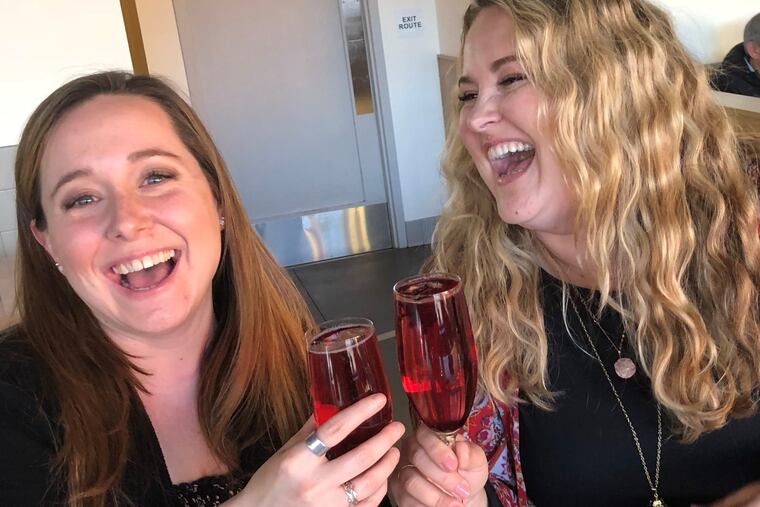Penn State grads tackle workplace wellness in new podcast
Two Penn State grads teamed up on a passion project to produce a podcast.

It happened over a glass of wine at a friend's wedding last year.
Katina Sawyer and Patricia Grabarek, classmates from their graduate school days at Pennsylvania State University where they studied organizational psychology, were kvetching about the disconnect between the research produced in their field and the people who could really use those tips on workplace wellness.
"We were lamenting the fact that there weren't really good ways to access the science," said Sawyer, 33, now of Alexandria, Va. They were especially frustrated that the field of wellness was overlooked. Companies didn't know how to create happy, healthy places to work, she said.
The pair decided to create their own evidence-based podcast about workplace wellness. They would translate what could be dull research into a fun format to help burned-out employees as well as senior leaders who could use their advice to create structural changes, said Grabarek, 32.
They got their Ph.D.s so other people wouldn't have to, said Sawyer, an assistant professor of management at George Washington University.
The Workr Beeing podcast would be their passion project. And they had been friends long enough to know that their similar work ethic would be a good match, she said.
Grabarek, a consultant in Marina del Rey, Calif., said they liked the format of a podcast because people could listen while they commute to work.
Since they live on opposite coasts, they use the video conferencing platform Google Hangouts to talk while they each record their own audio for better quality. The results are spliced together later.
>> READ MORE: This professor says the workplace is the fifth-leading cause of death in the U.S.
Their material comes largely from current events or hot topics in the workplace, Grabarek said.
One of their first podcasts tackled the negative perceptions around taking a break at work. Not the hour-long lunch break, but the micro-breaks that happen when workers get up for water or chat with colleagues.
Taking these micro-breaks can actually help with productivity but only if they are the right type of time-outs, they said. Employees who take a short break to help another employee or reflect on their own job and how it relates to the rest of the company, end up feeling more energized.
They have also expounded on the benefits of a good night's sleep, whether companies are good at creating a work-family balance for all employees, and mindfulness. All their podcasts are supported by journal articles and research papers, and occasionally TEDx talks on YouTube.
For their podcast about sleep, the pair deciphered a study that was published in the journal Organizational Behavior and Human Decision Processes about the consequences of late-night smartphone use and sleep.
"Looking at your smart phone for work purposes after 9 p.m. has negative impacts on your work engagement," said Sawyer in the podcast. Your sleep quantity and quality go down.
"So, basically don't look at your phone at night or else you are going to sleep more poorly, you are going to wake up in the morning feeling gross, and you are going feel less engaged at work the next day," she said.
Millennials in the workplace is one of their favorite topics.
"Research shows they are not different than other generations," said Grabarek. There are a lot of perceptions that older generations have about their younger co-workers that may not be true, she said.
For instance, there are plenty of Gen Xers or baby boomers who changed jobs several times when they were at the same point in their lives that millennials are in now. That typically happens early in a career until the employee finds the right fit, she said.
"Managers and leaders need to stop creating these stereotypes for millenials," Grabarek said in the podcast. She suggests that companies treat all the employees the same with the same benefits. "Stop singling out the younger generation when it comes to the workplace."
For now, the project is a labor of love. They eventually hope to build their audience and maybe turn the podcasts into a book, Sawyer said.
"There is no reason we can't make change and make a great idea happen," Grabarek said.